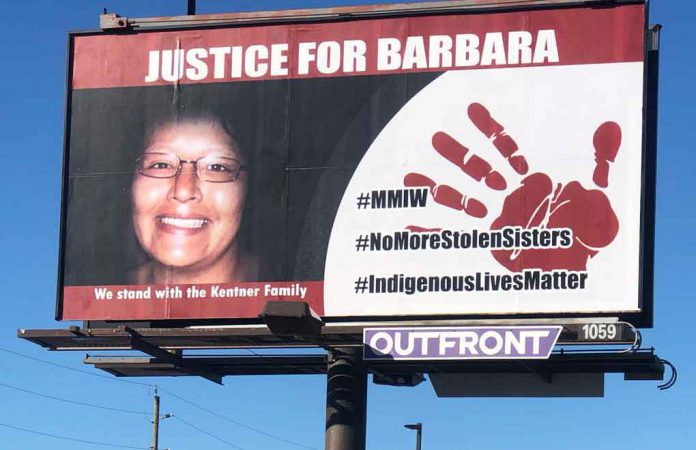Brayden Bushby Granted Day Parole by Parole Board
Thunder Bay, ON – Melissa Kentner, the sister of Barbara Kentner, who tragically lost her life after being struck by a trailer hitch thrown from a passing car has expressed her shock upon learning that the Brayden Bushby, the man found responsible and convicted by the Superior Court of Justice in Thunder Bay for the deadly act has been released on day parole.
The court case in Thunder Bay brought to many people, especially the Indigenous community the realities and dangers of living in the city. The case was controversial in that the initial charges were reduced from Second Degree Murder, but was reduced to Manslaughter.
Brayden Bushby had plead guilty to Aggravated Assault in the death of Barbara Kentner. That charge was conditionally stayed with a guilty charge.
Eight Year Sentence Barely Enough
Kentner laments that “Eight years isn’t anything these days, I guess,” and voiced her frustration that the individual responsible for her sister’s death was now free to walk the streets.
Brayden Bushby, was two years into an eight-year prison sentence for hurling the hitch at Barbara Kentner, resulting in her fatal injury.
Justice Pearce in Sentencing
Justice Pierce in sentencing Brayden Bushby stated, “It is a serious matter to impose sentence, and that it is a life altering event, not only for the person sentenced, but for the family. We all have an interest in this sentence”.
The Justice said that the impact on Thunder Bay in this case was huge. There were three community impact statements submitted to the court on this case.
Justice Pierce said, “What you did was not brave, not manly, and not impressive. You threw that trailer hitch without consideration of the victims”.
“As you now know, Barbara Kentner’s family was shattered by losing a special person”.
“The crown does not claim you targeted Indigenous women, but I have concluded you knew you were targeting women. You have joined in the disgusting activity of throwing things at Indigenous people”, concluded Justice Pierce.
“Residents of this city are angry at what you have done. Residents are offended that citizens can’t walk the streets safely in our community. “The ripples of this action has signalled to Indigenous people across Canada”
Justice Pearce continued, “There are no disposable people in this society, people should be able to walk freely in this city.”
“Violence done for pleasure”, is how Justice Pierce saw this attack
The Parole Board of Canada, a federal agency responsible for evaluating the release of individuals who have served prison sentences, detailed the case in a ruling issued on August 10th.
According to the report, on January 29, 2017, at 1 a.m., Bushby, who had been heavily intoxicated, positioned himself in the front seat of a car in Thunder Bay, Ontario. He then leaned out of an open window and “threw the hitch at the victim and her sister, who were walking along the side of the road.”
The hitch struck Barbara Kentner in the stomach, causing her immense pain and rupturing her small bowel. She spent months in the hospital and tragically passed away on July 4, 2017.
Initially charged with first-degree murder, Bushby’s charge was later reduced to manslaughter. He had previously applied for day parole but was denied by the board, with the option to reapply after six months.
The board’s report indicated that Bushby had abandoned an appeal on his sentence. The report also stated, “In summary, having considered both the aggravating and mitigating factors related to your risk of reoffending, it’s the Board’s opinion that your release on day parole to [withheld] would not present an undue risk to society and that this release will contribute to the protection of society by facilitating your reintegration as a law-abiding citizen.”
The parole board has imposed several restrictions on Bushby, including a requirement to report to the police on a daily basis, spend evenings at a “community residential facility,” abstain from alcohol consumption, and refrain from contacting the Kentner family.
Despite the parole board’s decision, Melissa Kentner expressed a different perspective, saying, “Today it felt like I got slapped in the face.” It’s worth noting that this remains the only conviction on Bushby’s record.
Grassroots Indigenous groups have expressed to NetNewsLedger that this decision by the Parole Board brings the legal system into disrepute.
What is Manslaughter?
Manslaughter is a criminal offence under the Criminal Code of Canada, and it is classified as a homicide offence. Homicide refers to the unlawful killing of a human being, and it can be classified into various categories, with manslaughter being one of them. Manslaughter is distinct from murder in that it lacks the specific intent to cause death, which is a crucial element in a murder charge.
Maximum Sentence is Life in Prison
In Canada, the maximum sentence for manslaughter is life imprisonment. Manslaughter is a serious criminal offense, and judges have the discretion to impose a life sentence when the circumstances of the case warrant it. However, it’s important to note that not all manslaughter convictions result in a life sentence. The actual sentence imposed in a manslaughter case will depend on various factors, including the specific details of the offense, the degree of culpability of the offender, and other relevant considerations. Judges consider these factors when determining the appropriate sentence, and sentences for manslaughter can vary widely.
Here’s a detailed explanation of manslaughter under the Criminal Code of Canada, including the potential sentences upon conviction:
1. Definition of Manslaughter:
- Manslaughter is the unlawful killing of another person without the intent to cause death.
- It can occur in various circumstances, including accidents, reckless behaviour, criminal negligence, or during the commission of certain unlawful acts.
2. Types of Manslaughter:
- Manslaughter can be divided into two main categories under Canadian law: a. Voluntary Manslaughter: This occurs when a person kills another person in the heat of the moment, often in response to provocation or while under the influence of extreme emotions (e.g., sudden and intense anger). While there is no intent to kill, there is an intent to cause harm. b. Involuntary Manslaughter: This occurs when a person causes another person’s death through negligent or reckless behaviour without any intent to cause harm. It includes situations where a person’s actions or omissions are so careless or dangerous that they create a substantial risk of harm to others.
3. Sentences Upon Conviction:
- The sentences for manslaughter convictions can vary widely depending on the specific circumstances of the case, the degree of culpability of the offender, and other factors. Judges have a degree of discretion in determining the appropriate sentence.
- Manslaughter is a serious offence, and the penalties upon conviction can range from fines to imprisonment. Sentences can be influenced by factors such as prior criminal record, the offender’s level of remorse, and the degree of recklessness or negligence involved.
- For Voluntary Manslaughter: The sentence for voluntary manslaughter is typically more severe than for involuntary manslaughter. It can result in a longer prison term, potentially ranging from several years to life imprisonment, depending on the circumstances.
- For Involuntary Manslaughter: The sentence for involuntary manslaughter may result in a prison term as well, although it is generally less severe than for voluntary manslaughter. Sentences can vary widely but often involve imprisonment for a number of years.
4. Parole Eligibility: Convicted individuals may become eligible for parole after serving a portion of their sentence, depending on various factors. Parole eligibility allows the offender to be released under certain conditions, such as good behaviour and participation in rehabilitation programs, while serving the remainder of their sentence in the community.
In summary, manslaughter under the Criminal Code of Canada refers to the unlawful killing of another person without the specific intent to cause death. The penalties upon conviction can vary widely and depend on factors such as the degree of culpability, the specific circumstances, and judicial discretion.







